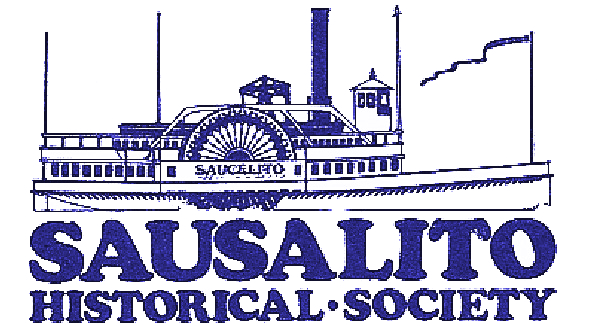By Doris Berdahl
The following article reproduces, with some minor editing, a piece that appeared in the Marin Scope in the summer of 1972. It marked the sale of Sausalito’s celebrated bookstore of the late 1950s and 1960s, the Tides (749 Bridgeway), by its co-founder Herb Beckman, a leader among Sausalito’s colorful literary and artistic set of that period. Beckman is interviewed here. The author is unknown.
Artist Serge Trubach was the semiofficial chronicler of places, personalities and events around town in the 1960s and ’70s. This is how he saw the Tides and its clientele in their role as Sausalito’s counterculture of that era. He called his drawing “The Tides’ David by Michelangelo Trubach.”
Courtesy of the Sausalito Historical Society
On July 31, 1957, when the Tides opened its doors, downtown Sausalito was like one big country store. There was almost no tourist business as we know it today. There were the people on the hill, there was Bridgeway, with its stores, its taverns, and there was the waterfront, which at that time was Bohemia, where painters and writers and other such lived with a kinship to the Beat Generation.
When Herb Beckman and Bill Ryan came to Sausalito, the most prominent features of Bridgeway were the Porthole, the Kettle, the Cobbler, Four Winds, the meat market and Rexall Drugs, where everybody ate breakfast. Sausalito went to bed, like lots of villages everywhere, at 8 p.m.
The Tides was started on a still sea, and on what Herb Beckman describes today as “a whim.” Both he and Bill Ryan were working in San Francisco at the time. Herb was installing a computer system for an insurance company. They continued working in the city for some time after the business got off the ground. Mary Beckman was the first employee. Very pregnant at the time, she served cakes and coffee and sold Greyhound bus tickets and books.
Robert Peterson, a poet and one of the first winners of the National Endowment for the Arts Award, and Don Umphreys were early partners, Herb recalls. After the first year, Bill Ryan moved to the upstairs office and started publishing Contact. Although short-lived, it became a nationally recognized literary magazine, attracting contributions from some of the most noted writers of the day. Among the most enduring employees were Pat Castle, John Bologni, Lenn Kanenson and Enid Foster, who, according to Herb, “built trees on the tables, made personal statements and gave the place artistic class.”
The Tides has changed over time. Books have crowded out the tables where originally people sat for hours over a cup of coffee. And items for sale have diminished the niches where, in the early days, conversation flowed, and musicians played. “When you’re in the book business, you’re always running ahead,” Beckman says. “You move with the changes in culture. And at the same time, you influence them by what you choose to do with the business, by how you contribute to things. In order to be both successful and creative, you must nurture a kind of ‘grace.’ I guess my philosophy is best represented by a card in the Tarot deck in which the character has one foot in the water and one foot on land.”
Sustaining the Tides has been what he calls a “balancing act,” embracing the economics of running a business, “playing store” and creating an open and free environment in which “you bring together the things you care about in a way that other people will participate if they care about those things, too.”
Beckman sold the Tides to Queva Lutz, a former fashion industry executive, and her partner Jerry Harrington, who told the press that under their ownership it would become “everyman’s bookstore,” with a larger and broader inventory. After launching her business on July 1, 1972, Lutz said in an interview in early 1973 that the ground level of the 1895-vintage building was to be “the thinker’s department” and would house books on psychology, philosophy, education, photography and poetry. The basement would be devoted to arts and crafts, art theory, and how-to and project books. She had plans to establish an art gallery, featuring one-man shows. Her view of a bookstore, she said, was that it should be a cultural center for the whole community. One tradition from the early days would never change, however: coffee would be served from 10 a.m. to 11 p.m. 363 days of the year (Christmas and New Year’s Day excepted). “The Tides is the Tides,” she said, “and the doors are always open.”
That modified reincarnation of the original bookstore was replaced in the later 1970s with a third independently owned enterprise, Upstart Crow & Co., which attempted to perpetuate the special aura at 749 established by Herb Beckman and Bill Ryan. But tourism was on the rise by then and downtown rents and chain booksellers were driving out places like the Tides and its spiritual heirs. By the 1980s, the century-old Victorian at the turn of the road on central Bridgeway, its towering false façade vaguely suggesting something out of a western movie, had become home to a series of retail establishments catering to an altogether different clientele. For better or for worse, it remains so today.

